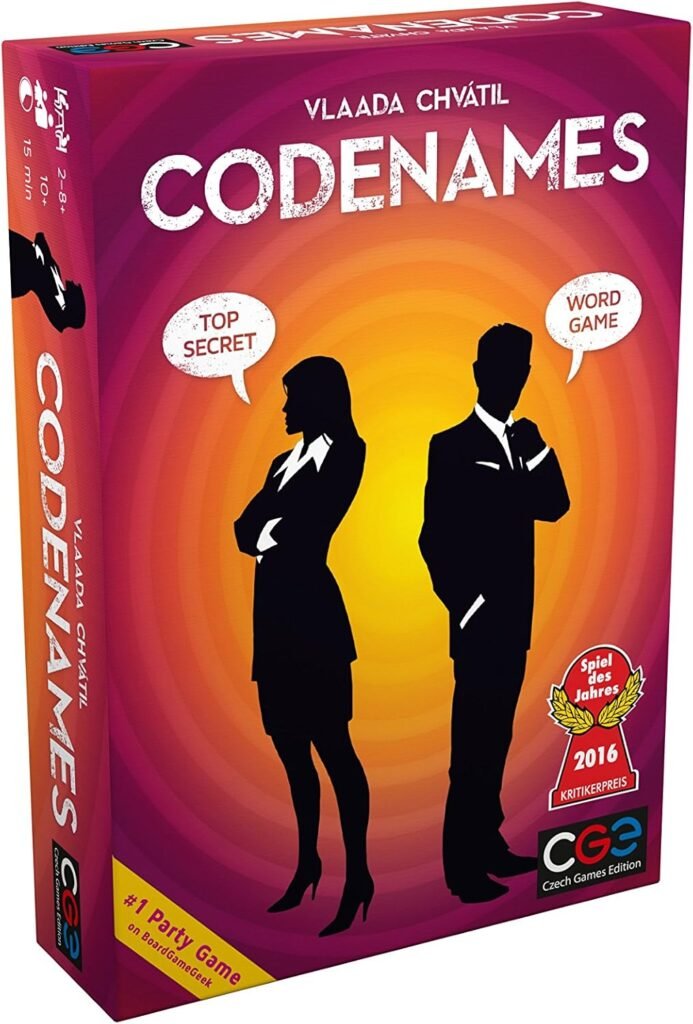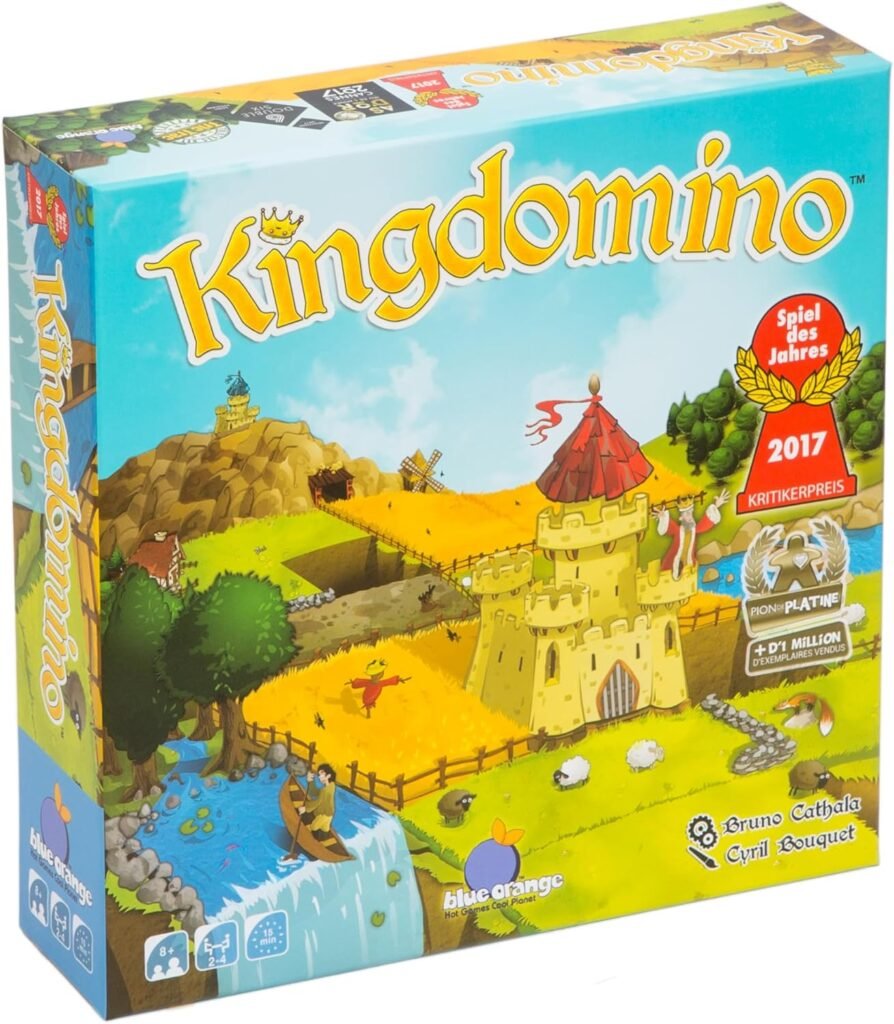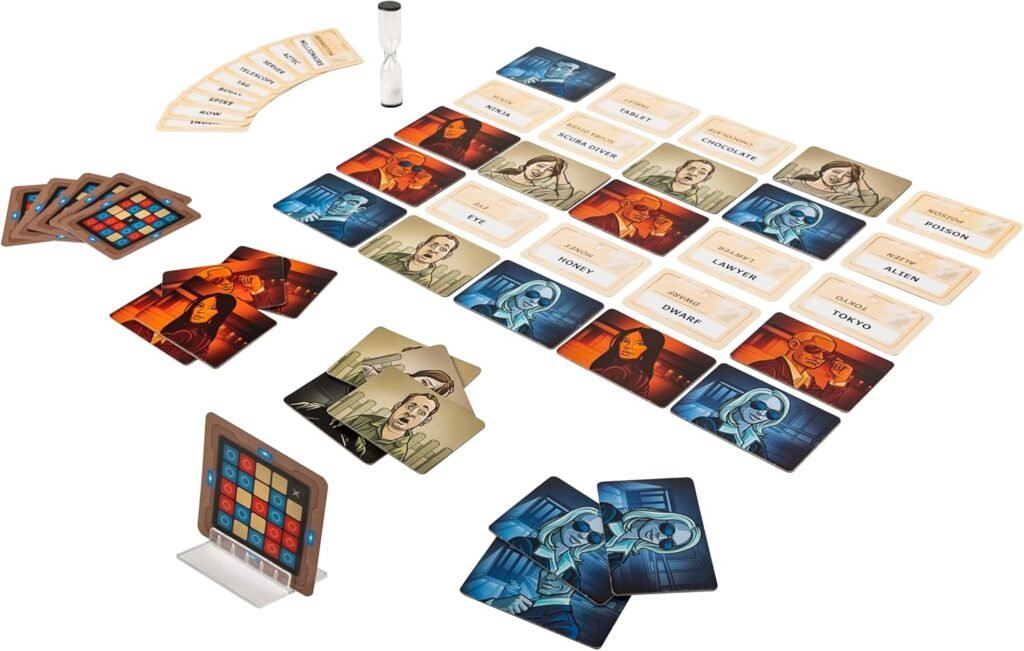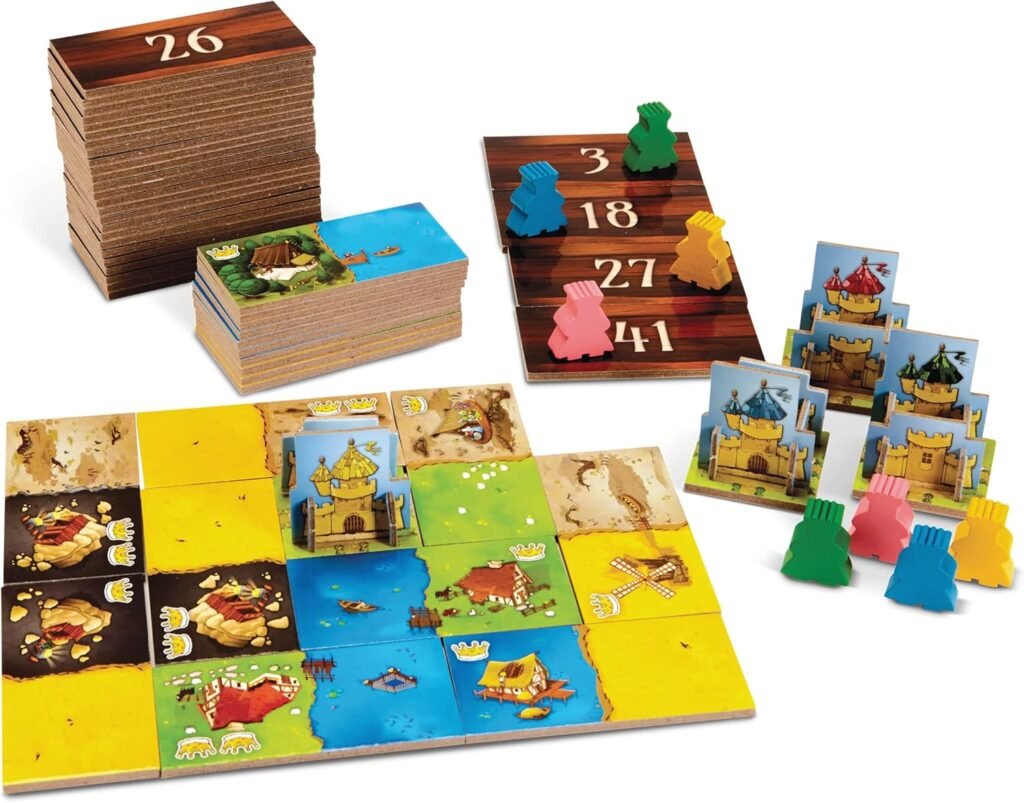
Introduction to Winners of the Spiel des Jahres Award
Ah, the Spiel des Jahres award—think of it as the ultimate merit badge for German board games. Each year, the most engaging and innovative games are spotlighted, making us all want to gather around the table, clutching our dice and tiles like they’re made of gold. Forget the glitz and glamour of Hollywood; this is where the real drama unfolds!
Now, I’ve played my fair share of these winners, and two that really stand out are Codenames (2016) and Kingdomino (2017). They might both have the Spiel des Jahres title under their belts, but trust me, they’re as different as night and day.
Codenames, the brainchild of Vladimír Chvátil, is basically a game of linguistic gymnastics. Imagine yourself as a secret agent trying to make your teammates guess the right words on a grid with just a single clue. It’s like playing charades, but without the risk of pulling a muscle. On the flip side, Kingdomino, designed by Bruno Cathala, turns you into a medieval monarch building a kingdom with domino-like tiles. It’s all about strategy and planning, minus the plague and jousting tournaments.
These games have created some serious buzz among fans of German board games. And let’s face it, any game that can keep a room full of people entertained without devolving into a shouting match is a winner in my book. But which one really rules the roost? Stick around, and we’ll find out!
Codenames: The Game of Words and Hints

Codenames: The Game of Words and Hints
Let’s kick things off with Codenames, the brainchild of Vladimír Chvátil, brought to us by Czech Games Edition. This clever word game snatched the Spiel des Jahres award in 2016. Picture this: you’re a secret agent, but instead of dodging lasers and leaping over rooftops, you’re desperately trying to get your teammates to guess “banana” using just the word “yellow.” Oh, and you’re doing it all with a grid full of random words that could make or break your mission. No pressure, right?
In Codenames, you give one-word clues to connect various words on the grid while your teammates try to decode your cryptic hints. It’s like playing charades with words, minus the risk of dislocating a shoulder. The game shines in social settings, especially if you have a knack for wordplay or just love watching your friends squirm as they overthink every clue you give them.
One of the game’s biggest perks is how it fosters teamwork and creativity. It’s perfect for family gatherings or friend groups who enjoy a good laugh, particularly when someone connects “octopus” to “ink” but somehow ends up leading their team to “ocean” instead. Seriously, some of the mental leaps people make are pure comedy gold.
However, not everything is peaches and cream. Codenames can be a bit of a drag for folks who aren’t into words or language-based games. If you’re someone who’d rather solve a Rubik’s Cube blindfolded than play Scrabble, you might find yourself wishing you were anywhere else. It also has a bit of a learning curve; new players might struggle to grasp the nuances of giving and interpreting clues without a few practice rounds.
Another hiccup? The potential for analysis paralysis. Some players might spend ages mulling over a single clue, turning a quick game night into an all-nighter. If you have that one friend who takes forever to decide in any game, you might want to set a timer and give them a gentle nudge—right off their seat.
In any case, Codenames has earned its spot on my game shelf for a reason. It’s a versatile game that’s as entertaining as it is challenging. But hey, that’s just my take. What about you, dear readers? Have you had any memorable moments with Codenames? What’s the funniest clue mix-up you’ve encountered?
Kingdomino: Crafting Your Own Realm

Ah, Kingdomino, where you get to live out your fantasy of being a medieval ruler—without the mess of managing a real kingdom. This little gem, brainchild of Bruno Cathala and brought to life by Pegasus Spiele, snagged the 2017 Spiel des Jahres award for good reason. This tile-laying game claimed the 2017 Spiel des Jahres award. Imagine stacking colorful domino-like tiles to craft a thriving kingdom. Easy to learn, quick to play, and yet it packs a decent strategic punch. What’s not to love?
In Kingdomino, you’re selecting and placing tiles with different terrains to build the most point-worthy kingdom. The gameplay is all about matching these terrains and making sure your kingdom flourishes. It’s like playing a puzzle game, but you get to be a royal architect. One of the standout features is its balance between simplicity and depth. Even your cousin who thinks “strategy” means guessing which hand the coin is in can grasp it quickly. Yet, it keeps even the seasoned gamers engaged with its clever mechanics.
What I love about Kingdomino is how it makes you feel smart without making you feel stupid first. It’s the perfect game for those nights when you want something mentally stimulating but not brain-melting. Plus, it’s quick—each game lasts about 15-20 minutes. You can easily squeeze in a few rounds between dinner and dessert.
Now, onto the downsides. While you’re busy building your little piece of paradise, the game can feel a bit isolated. There’s not much in the way of direct player interaction. Sure, you can mess with your opponent by snagging a tile they want, but mostly you’re in your own bubble, arranging your kingdom tiles like some medieval Marie Kondo. If you’re craving intense back-and-forth battles, this might leave you wanting more.
Another minor gripe is that the game can feel a bit samey after multiple plays. You’re always doing the same thing: picking tiles, placing tiles, scoring tiles. It’s fun, don’t get me wrong, but it’s not going to be the main event of a game night marathon. Still, it’s a solid choice for a quick, satisfying game.
So there you have it—Kingdomino in all its tile-laying glory.
Face-off: Codenames vs. Kingdomino

Alright, let’s pit these two against each other and see which one comes out on top in my living room showdown. Codenames is the ultimate social chameleon. It’s like the party guest who can chat with anyone and make you laugh, even if you’re stuck on opposite sides of the political spectrum. Perfect for large gatherings, it makes everyone feel like a genius—until they’re not. Trust me, watching someone try to link “spaghetti” to “Italy” but end up confusing everyone with “noodle” is pure entertainment gold.
On the other hand, Kingdomino is the strategic mastermind. It’s that friend who quietly observes, then makes a move that leaves everyone else scrambling. While Codenames is the life of the party, Kingdomino is the thoughtful dinner guest who brings a bottle of wine and knows just the right moment to share an insightful anecdote. It’s ideal for those one-on-one or small group sessions where you want to flex your mental muscles without getting too heated.
Families might lean towards Codenames for its sheer fun factor and ability to keep a larger crowd engaged. It’s like the Swiss Army knife of party games: versatile, easy to whip out, and always handy in a pinch. Plus, there’s something satisfying about that collective “aha!” moment when your team finally decodes a tricky clue.
But let’s not dismiss Kingdomino too quickly. It’s got its own charm, especially if you relish the satisfaction of a well-laid plan. It’s quick, yet it leaves you feeling accomplished—like you just completed a puzzle without the missing pieces, for once. The downside? If you’re a social butterfly who thrives on interaction, Kingdomino might feel like you’re playing Solitaire at a party. You’re mostly focused on your own little kingdom, occasionally glancing over to see if you can snag a tile your opponent needs.
While both games shine in their own right, they cater to different moods and settings. It’s like choosing between pizza and sushi—both delicious, but you pick based on what you’re craving. For me, Kingdomino edges out Codenames by a hair, simply because I love the blend of simplicity and strategy. Plus, the tile-laying feels oddly satisfying, like Marie Kondo-ing your medieval domain.
So, what about you, dear readers? Which game has earned a spot on your game night lineup? Have you had any hilarious moments with Codenames or pulled off a brilliant move in Kingdomino? Share your stories—I can’t wait to hear your game night triumphs and disasters!

Benefits and Drawbacks of Each Game
Alright, let’s cut to the chase: Codenames and Kingdomino each bring their own flair to the game table, and trust me, I’ve spent way too many hours playing both.
First up, Codenames. This game is an absolute riot if you love wordplay and watching your friends go down mental rabbit holes. The teamwork it fosters is incredible; you’ll see bonds strengthen and friendships tested as people try to decode your cryptic one-word clues. But, there’s a catch: if words aren’t your thing, this game can feel like you’re stuck in an eternal round of Taboo. You might find yourself zoning out while others are passionately debating whether “apple” is closer to “fruit” or “Newton.”
Then there’s Kingdomino, a game that hits the sweet spot between simplicity and strategy. It’s quick to pick up but offers enough depth to keep even the most seasoned board gamers entertained. One of the best parts is how satisfying it feels to build your kingdom, like putting together a colorful jigsaw puzzle. However, it does have its limitations. The lack of direct player interaction can make you feel like you’re just playing parallel solitaire games. You’re more focused on your own kingdom than what your opponents are doing, which can be a bit isolating if you crave that back-and-forth.
And let’s not forget the elephant in the room: the dreaded analysis paralysis. Codenames can grind to a halt if someone takes forever to think of the perfect clue. On the flip side, Kingdomino’s tile selection can lead to overthinking, but at least the rounds are short enough to keep things moving.
One thing that’s worth mentioning: both games have a strong replay value but in different ways. Codenames shines with different groups of people; you’ll get new, often hilarious, results every time. Kingdomino, though, keeps you coming back because it’s just so darn satisfying to see your perfectly crafted kingdom at the end of each game, even if you don’t win.
So, what’s your take, folks? Do you prefer the mental gymnastics of Codenames or the strategic tile-laying of Kingdomino? Any funny moments or epic fails you’d like to share? I’m all ears!
The Slight Victor: A Personal Viewpoint
Alright, so after countless game nights and more laughter than I care to admit, I’ve got to hand the crown to Kingdomino. There’s something incredibly satisfying about laying down those colorful tiles and watching your kingdom come to life. It’s quick to learn, yet still gives your brain a decent workout. Plus, I love that it wraps up in 15-20 minutes, perfect for squeezing in a few rounds without dedicating an entire evening.
But let’s be real: Codenames is no slouch either. It’s the game I turn to when I’ve got a big group over and need something that gets everyone involved. The hilarious misunderstandings and lightbulb moments are always a highlight. I mean, who doesn’t love watching their friends overthink “apple” and somehow link it to “Newton” instead of “fruit”? Comedy gold, my friends.
Still, Kingdomino edges it out for me because of its balance of strategy and simplicity. Even my cousin, who usually avoids anything that sounds remotely like “strategy,” picked it up and got hooked. It’s like the perfect blend of challenge and relaxation—like sipping a fine wine while putting together a jigsaw puzzle.
But hey, I’m not the ultimate authority here. What about you guys? Have you tried both games? Which one has more permanent residence on your game night lineup? Maybe you’ve had some epic fails or incredible victories that could tip the scale for someone else.
And let’s not forget, what other German board games do you think could rival these two for the title of the ultimate game night champ? I’m always on the lookout for the next great game to add to my collection. Spill the beans, folks!
Wrap-up and Thought-Provoking Questions
Alright, folks, let’s wrap this up with some final thoughts and a few burning questions for you to mull over. Both Codenames and Kingdomino have their own unique charms and quirks, making them excellent additions to any game night lineup. Whether you’re a fan of mind-bending wordplay or prefer the satisfying strategy of tile-laying, there’s something here for everyone.
Codenames is like that wild card friend who can turn any gathering into a hilarious fiasco. It’s perfect for big groups, especially when you want to see who can come up with the most outlandish word connections. But let’s be honest, it can be a bit of a drag if you’re not into language games or if you’re stuck waiting for someone who treats every clue like it’s a riddle from a Sphinx.
On the flip side, Kingdomino is your reliable buddy who brings just the right amount of challenge without making your brain feel like it’s doing a triathlon. The quick setup and gameplay make it an easy go-to for those nights when you just want to relax but still want a bit of mental stimulation. The downside? If you’re itching for intense player interaction, you might find yourself feeling like you’re playing a solo game with some background noise.
But enough about my opinions—what about you? Have you played either (or both) of these games? Which one do you find yourself reaching for more often? Maybe you’ve got a hilarious story about a particularly baffling Codenames clue or a triumphant moment when you snagged the perfect Kingdomino tile right under your opponent’s nose.
And while we’re at it, let’s not stop the game talk here. What other German board games have you tried that could give these two a run for their money? I’m always on the hunt for new games to test out, especially ones that promise a mix of fun and strategy.
So, spill the beans: Do you prefer the social chaos of Codenames or the strategic serenity of Kingdomino? Any epic fails or standout victories you’d like to share? And what hidden gems in the world of German board games should I add to my ever-growing collection? Let’s get the conversation going—I’m all ears!
